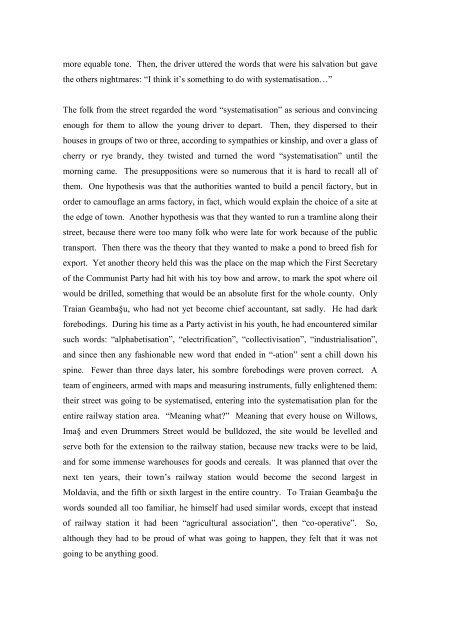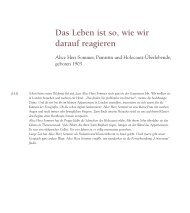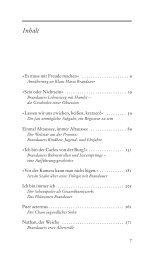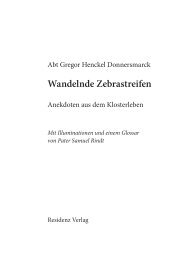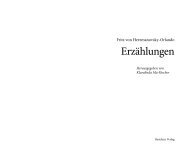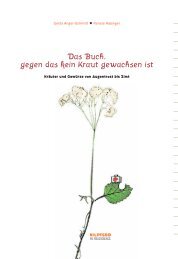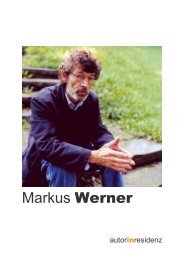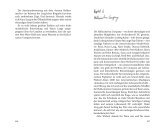Chapter 1 In which Mrs Milica gains ingress to the Colonel's house ...
Chapter 1 In which Mrs Milica gains ingress to the Colonel's house ...
Chapter 1 In which Mrs Milica gains ingress to the Colonel's house ...
You also want an ePaper? Increase the reach of your titles
YUMPU automatically turns print PDFs into web optimized ePapers that Google loves.
more equable <strong>to</strong>ne. Then, <strong>the</strong> driver uttered <strong>the</strong> words that were his salvation but gave<br />
<strong>the</strong> o<strong>the</strong>rs nightmares: “I think it’s something <strong>to</strong> do with systematisation…”<br />
The folk from <strong>the</strong> street regarded <strong>the</strong> word “systematisation” as serious and convincing<br />
enough for <strong>the</strong>m <strong>to</strong> allow <strong>the</strong> young driver <strong>to</strong> depart. Then, <strong>the</strong>y dispersed <strong>to</strong> <strong>the</strong>ir<br />
<strong>house</strong>s in groups of two or three, according <strong>to</strong> sympathies or kinship, and over a glass of<br />
cherry or rye brandy, <strong>the</strong>y twisted and turned <strong>the</strong> word “systematisation” until <strong>the</strong><br />
morning came. The presuppositions were so numerous that it is hard <strong>to</strong> recall all of<br />
<strong>the</strong>m. One hypo<strong>the</strong>sis was that <strong>the</strong> authorities wanted <strong>to</strong> build a pencil fac<strong>to</strong>ry, but in<br />
order <strong>to</strong> camouflage an arms fac<strong>to</strong>ry, in fact, <strong>which</strong> would explain <strong>the</strong> choice of a site at<br />
<strong>the</strong> edge of <strong>to</strong>wn. Ano<strong>the</strong>r hypo<strong>the</strong>sis was that <strong>the</strong>y wanted <strong>to</strong> run a tramline along <strong>the</strong>ir<br />
street, because <strong>the</strong>re were <strong>to</strong>o many folk who were late for work because of <strong>the</strong> public<br />
transport. Then <strong>the</strong>re was <strong>the</strong> <strong>the</strong>ory that <strong>the</strong>y wanted <strong>to</strong> make a pond <strong>to</strong> breed fish for<br />
export. Yet ano<strong>the</strong>r <strong>the</strong>ory held this was <strong>the</strong> place on <strong>the</strong> map <strong>which</strong> <strong>the</strong> First Secretary<br />
of <strong>the</strong> Communist Party had hit with his <strong>to</strong>y bow and arrow, <strong>to</strong> mark <strong>the</strong> spot where oil<br />
would be drilled, something that would be an absolute first for <strong>the</strong> whole county. Only<br />
Traian Geamba§u, who had not yet become chief accountant, sat sadly. He had dark<br />
forebodings. During his time as a Party activist in his youth, he had encountered similar<br />
such words: “alphabetisation”, “electrification”, “collectivisation”, “industrialisation”,<br />
and since <strong>the</strong>n any fashionable new word that ended in “-ation” sent a chill down his<br />
spine. Fewer than three days later, his sombre forebodings were proven correct. A<br />
team of engineers, armed with maps and measuring instruments, fully enlightened <strong>the</strong>m:<br />
<strong>the</strong>ir street was going <strong>to</strong> be systematised, entering in<strong>to</strong> <strong>the</strong> systematisation plan for <strong>the</strong><br />
entire railway station area. “Meaning what?” Meaning that every <strong>house</strong> on Willows,<br />
Ima§ and even Drummers Street would be bulldozed, <strong>the</strong> site would be levelled and<br />
serve both for <strong>the</strong> extension <strong>to</strong> <strong>the</strong> railway station, because new tracks were <strong>to</strong> be laid,<br />
and for some immense ware<strong>house</strong>s for goods and cereals. It was planned that over <strong>the</strong><br />
next ten years, <strong>the</strong>ir <strong>to</strong>wn’s railway station would become <strong>the</strong> second largest in<br />
Moldavia, and <strong>the</strong> fifth or sixth largest in <strong>the</strong> entire country. To Traian Geamba§u <strong>the</strong><br />
words sounded all <strong>to</strong>o familiar, he himself had used similar words, except that instead<br />
of railway station it had been “agricultural association”, <strong>the</strong>n “co-operative”. So,<br />
although <strong>the</strong>y had <strong>to</strong> be proud of what was going <strong>to</strong> happen, <strong>the</strong>y felt that it was not<br />
going <strong>to</strong> be anything good.


